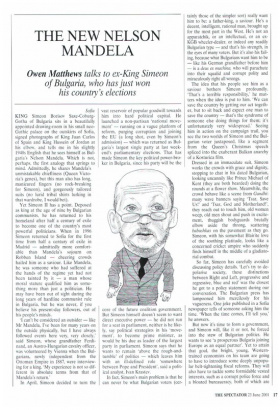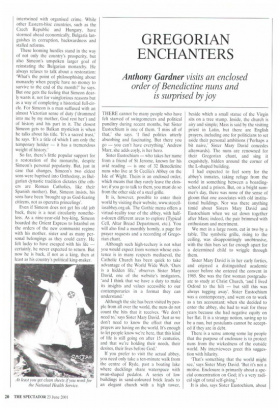THE NEW NELSON MANDELA
Owen Matthews talks to ex-King Simeon of Bulgaria, who has just won his country's elections
Sofia KING Simeon Borisov Saxe-CoburgGotha of Bulgaria sits in a beautifully appointed drawing-room in his small neoGothic palace on the outskirts of Sofia, signed photographs of King Juan Carlos of Spain and King Hussein of Jordan at his elbow, and tells me in his slightly 1940s English that he sees himself as Bulgaria's Nelson Mandela. Which is not, perhaps, the first analogy that springs to mind. Admittedly, he shares Mandela's unmistakable chiefliness (Queen Victoria's genes), but this man also has long, manicured fingers (no rock-breaking for Simeon), and gorgeously tailored suits (no lurid tribal shirts lurking in that wardrobe, I would bet).
Yet Simeon II has a point. Deposed as king at the age of nine by Bulgarian communists, he has returned to his homeland after half a century of exile to become one of the country's most powerful politicians. When in 1996 Simeon returned to Sofia for the first time from half a century of exile in Madrid — admittedly more comfortable than Mandela's sojourn on Robben Island — cheering crowds hailed him as a saviour. Like Mandela, he was someone who had suffered at the hands of the regime yet had not been tainted by it — a man whose moral stature qualified him as something more than just a politician. He may have been out of sight during the long years of hardline communist rule in Bulgaria, but he was never, if you believe his present-day followers, out of his people's minds.
'I can't be considered an outsider — like Mr Mandela, I've been for many years on the outside physically, but I have always followed events here very, very closely,' said Simeon, whose grandfather Ferdinand, an Austro-Hungarian cavalry officer, was volunteered by Vienna when the Bulgarians, newly independent from the Ottoman Empire in 1887, were interviewing for a king. 'My experience is not so different in absolute terms from that of Mandela's return.'
In April, Simeon decided to turn the vast reservoir of popular goodwill towards him into hard political capital. He launched a non-partisan 'national movement' — running on a vague platform of reform, purging corruption and joining the EU (a long shot, even by Simeon's admission) — which was returned as Bulgaria's largest single party at last weekend's parliamentary elections. That has made Simeon the key political power-broker in Bulgaria, since his party will be the core of the future coalition government. But Simeon himself doesn't seem to want direct executive power — he did not run for a seat in parliament, neither is he likely, say political strategists in his 'movement', to become prime minister, as would be his due as leader of the largest party in parliament. Simeon says that he wants to remain 'above the rough-andtumble' of politics — which leaves him with an ill-defined role 'somewhere between Pope and President', said a political analyst. Ivan Krastev.
In fact, Simeon's main problem is that he can never be what Bulgarian voters (cer tainly those of the simpler sort) really want him to be: a father-king, a saviour. He's a decent, intelligent, rational man, brought up for the most part in the West. He's not an apparatchik, or an intellectual, or an ex KGB wheeler-dealer, or indeed any readily Bulgarian type — and that's his strength, in the eyes of many voters. But it's also his fail ing, because what Bulgarians want him to be — like his German grandfather before him — is a deus ex machina, who will parachute into their squalid and corrupt polity and miraculously right all wrongs.
The idea that his people see him as a saviour bothers Simeon profoundly.
'That's a terrible responsibility,' he mut ters when the idea is put to him. 'We can save the country by getting our act togeth er, but to sit back and expect one man to save the country — that's the syndrome of someone else doing things for them; it's unfortunately very widespread.' Seeing him in action on the campaign trail, you see the two worlds of Simeon and the Bul garian voter juxtaposed, like a segment from the Queen's Christmas speech spliced into the exuberant Balkan anarchy of a Kosturica film.
Dressed in an immaculate suit, Simeon works the crowds with grace and dignity, stopping to chat in his dated Bulgarian, looking uncannily like Prince Michael of Kent (they are both bearded) doing the rounds at a flower show. Meanwhile, the
crowd behave like a scene from Gandhi: many wave banners saying 'Tsar, Save
Us!' and 'Tsar, God and Motherland!', they reach out to touch him, old women weep, old men shout and push in excite ment, thuggish bodyguards brutally elbow aside the throng, scattering babushkas on the pavement as they go.
Simeon, with his somewhat Blairite love of the soothing platitude, looks like a concerned cricket umpire who suddenly finds himself in the middle of a gladiatorial combat.
So far, Simeon has carefully avoided discussing policy details. 'Let's try to de polarise society, these distinctions between Right and Left, progressive and regressive, blue and red' was the closest he got to a policy statement during our conversation. The Bulgarian press has lampooned him mercilessly for his
vagueness. One joke published in a Sofia newspaper tells of someone asking him the time. 'When the time comes, I'll tell you,' he answers.
But now it's time to form a government, and Simeon will, like it or not, be forced into the stew of Bulgarian politics. He wants to see 'a prosperous Bulgaria joining Europe as an equal partner'. Yet to attain that goal, the bright, young, Western trained economists on his team are going to have to introduce some deeply unpopu lar belt-tightening fiscal reforms. They will also have to tackle some formidable vested interests, such as a corrupt police force and a bloated bureaucracy, both of which are intertwined with organised crime. While other Eastern-bloc countries, such as the Czech Republic and Hungary, have stormed ahead economically, Bulgaria languishes in corruption, backwardness and stalled reforms.
These looming hurdles stand in the way of not only the country's prosperity, but also Simeon's unspoken larger goal of reinstating the Bulgarian monarchy. He always refuses to talk about a restoration: 'What's the point of philosophising about monarchy when people have no money to survive to the end of the month?' he says. But one gets the feeling that Simeon dearly wants it, not for vainglorious reasons but as a way of completing a historical full-circle. For Simeon is a man suffused with an almost Victorian sense of duty ('drummed into me by my mother, God rest her') and of history and his part in it. The closest Simeon gets to Balkan mysticism is when he talks about his title. 'It's a sacred trust,' he says. 'It's a title of which I am only the temporary holder — it has a tremendous weight of history.'
So far, there's little popular support for a restoration of the monarchy, despite Simeon's personal popularity. But, just in case that changes, Simeon's two eldest sons were baptised into Orthodoxy, as Bulgarian dynastic tradition dictates (the others are Roman Catholics, like their Spanish mother). But, Simeon insists, his sons have been 'brought up as God-fearing citizens, not as operetta princelings'.
Even if Simeon does not get his old job back, there is a neat circularity nonetheless. As a nine-year-old boy-king, Simeon boarded the Orient Express to Istanbul on the orders of the new communist regime with his mother, sister and as many personal belongings as they could carry. He felt lucky to have escaped with his life — certainly, he never expected to return. But now he is back, if not as a king, then at least as his country's political king-maker.



































































 Previous page
Previous page